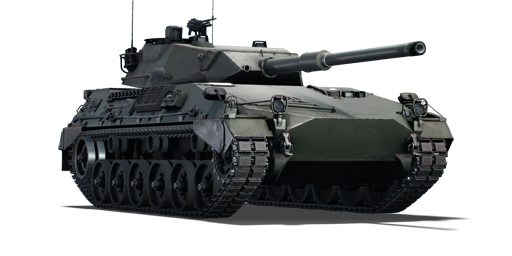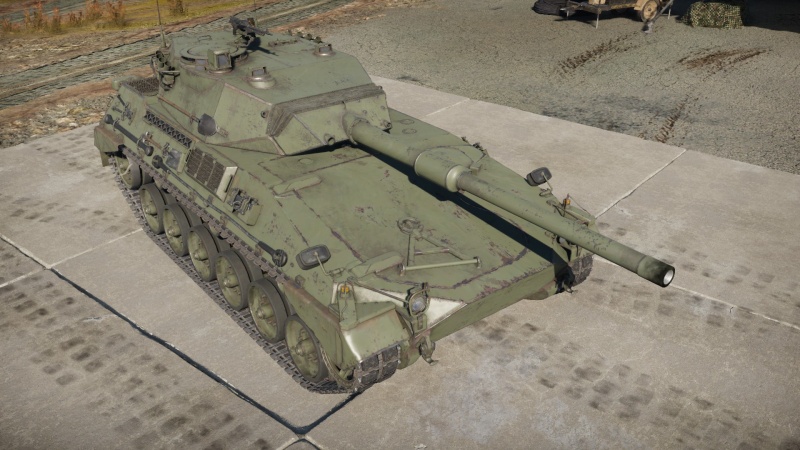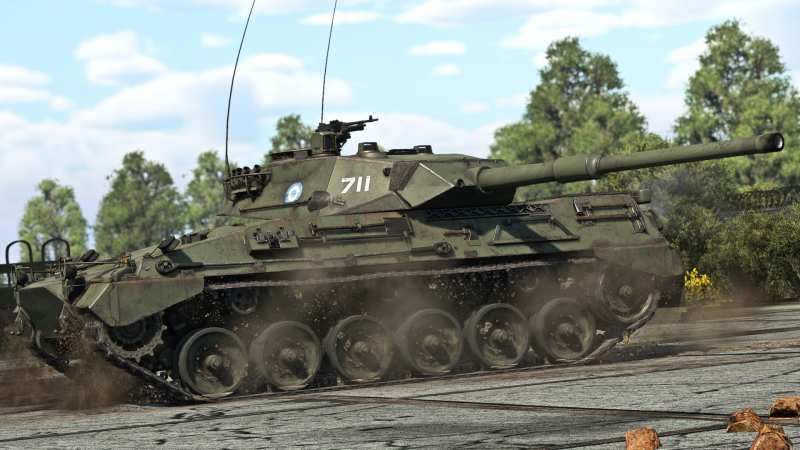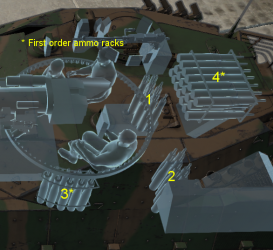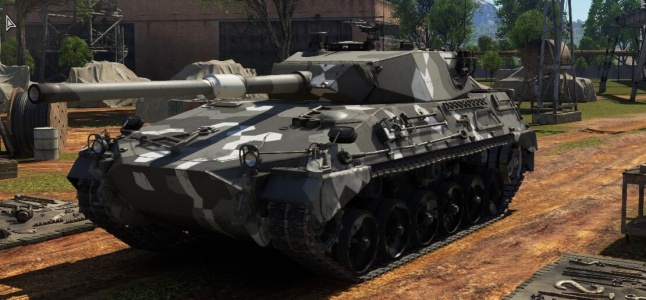Difference between revisions of "TAM"
(→Ammo racks) |
(→History: grammar) (Tag: Visual edit) |
||
| (5 intermediate revisions by 3 users not shown) | |||
| Line 6: | Line 6: | ||
{{Specs-Card | {{Specs-Card | ||
|code=germ_thyssen_henschel_tam | |code=germ_thyssen_henschel_tam | ||
| − | |images={{Specs-Card-Image|GarageImage_{{PAGENAME}}.jpg}} | + | |images={{Specs-Card-Image|GarageImage_{{PAGENAME}}.jpg|ArtImage_{{PAGENAME}}.png}} |
}} | }} | ||
| Line 21: | Line 21: | ||
The armour is composed of welded steel, providing protection up to 32 mm. The front can defend against 12.7 mm machine gun ammo, but the side armour is only proof against standard machine guns of 7.62 mm. However, most enemies that can be faced will usually have a 12.7 mm machine gun or larger in their possession, making it so even a burst of bullets could riddle the TAM with holes. With this in mind, take caution when flanking a tank with a disabled gun to get a side shot, as you can easily lose a few crew members to machine gunfire. This becomes less of an issue after unlocking the APFSDS round when side shots are rarely as necessary. The TAM also is vulnerable to overpressure, so large-calibre HE rounds have a chance of instantly destroying the vehicle. | The armour is composed of welded steel, providing protection up to 32 mm. The front can defend against 12.7 mm machine gun ammo, but the side armour is only proof against standard machine guns of 7.62 mm. However, most enemies that can be faced will usually have a 12.7 mm machine gun or larger in their possession, making it so even a burst of bullets could riddle the TAM with holes. With this in mind, take caution when flanking a tank with a disabled gun to get a side shot, as you can easily lose a few crew members to machine gunfire. This becomes less of an issue after unlocking the APFSDS round when side shots are rarely as necessary. The TAM also is vulnerable to overpressure, so large-calibre HE rounds have a chance of instantly destroying the vehicle. | ||
| − | '''Armour | + | '''Armour type:''' |
| − | * Rolled | + | * Rolled homogeneous armour (hull, turret) |
| − | * Cast | + | * Cast homogeneous armour (gunner periscope) |
{| class="wikitable" | {| class="wikitable" | ||
| Line 46: | Line 46: | ||
<!-- ''Write about the mobility of the ground vehicle. Estimate the specific power and manoeuvrability, as well as the maximum speed forwards and backwards.'' --> | <!-- ''Write about the mobility of the ground vehicle. Estimate the specific power and manoeuvrability, as well as the maximum speed forwards and backwards.'' --> | ||
| − | {{tankMobility|abMinHp= | + | {{tankMobility|abMinHp=1,116|rbMinHp=637}} |
The mobility is not bad, with a max of 75 km/h (RB) on the road in forward and -50 km/h in reverse. Off-road mobility is quite average, especially on flat terrain, but there is a poor steering response. The TAM is powered by a MTU (Motoren- und Turbinen-Union Friedrichshafen GmbH) MB 833 Ka-500 520 kW (720 hp) that produces a good 720 hp at 2,400 rpm. | The mobility is not bad, with a max of 75 km/h (RB) on the road in forward and -50 km/h in reverse. Off-road mobility is quite average, especially on flat terrain, but there is a poor steering response. The TAM is powered by a MTU (Motoren- und Turbinen-Union Friedrichshafen GmbH) MB 833 Ka-500 520 kW (720 hp) that produces a good 720 hp at 2,400 rpm. | ||
| Line 79: | Line 79: | ||
==== Ammunition ==== | ==== Ammunition ==== | ||
| − | { | + | {{:FMK.4 Modelo 1L (105 mm)/Ammunition|DM13, DM512, DM12, DM23, M416}} |
| − | |||
| − | |||
| − | |||
| − | |||
| − | |||
| − | |||
| − | |||
| − | |||
| − | |||
| − | |||
| − | |||
| − | |||
| − | |||
| − | |||
| − | |||
| − | |||
| − | |||
| − | |||
| − | |||
| − | |||
| − | |||
| − | |||
| − | |||
| − | |||
| − | |||
| − | |||
| − | |||
| − | |||
| − | |||
| − | |||
| − | |||
| − | | DM13 | ||
| − | |||
| − | |||
| − | |||
| − | |||
| − | |||
| − | |||
| − | |||
| − | |||
| − | |||
| − | |||
| − | |||
| − | |||
| − | |||
| − | |||
| − | |||
| − | |||
| − | |||
| − | |||
| − | |||
| − | |||
| − | |||
| − | |||
==== [[Ammo racks]] ==== | ==== [[Ammo racks]] ==== | ||
| Line 202: | Line 148: | ||
* First ammo rack has more than enough shells for a battle | * First ammo rack has more than enough shells for a battle | ||
* By loading 21 shells all ammo racks except the one in the turret rear can be emptied | * By loading 21 shells all ammo racks except the one in the turret rear can be emptied | ||
| − | |||
'''Cons:''' | '''Cons:''' | ||
| Line 217: | Line 162: | ||
In 1973 however, the Ministry of Defense drew up a set of requirements for a completely new combat vehicle that would be produced domestically and would to enter service by 1980. Despite knowing what they wanted, Argentinian engineers lacked the technical know-how in order to actually design and produce such a vehicle. Faced with this problem, the Argentinian government sought collaboration with a foreign company in order to design and build the vehicle they wanted. Eventually, a contracted was signed with the German Thyssen-Henschel company, a joint development effort soon ensued. | In 1973 however, the Ministry of Defense drew up a set of requirements for a completely new combat vehicle that would be produced domestically and would to enter service by 1980. Despite knowing what they wanted, Argentinian engineers lacked the technical know-how in order to actually design and produce such a vehicle. Faced with this problem, the Argentinian government sought collaboration with a foreign company in order to design and build the vehicle they wanted. Eventually, a contracted was signed with the German Thyssen-Henschel company, a joint development effort soon ensued. | ||
| − | The TAM (Tanque Argentino Mediano, eng: Argentinian Medium Tank), as it would be designated, was based off the German Marder IFV and equipped with a modification of the British | + | The TAM (Tanque Argentino Mediano, eng: Argentinian Medium Tank), as it would be designated, was based off the German Marder IFV and equipped with a modification of the British Royal Ordnance L7A3 cannon that was produced in Germany. The first two prototypes of the TAM were built in 1976 and 1977 respectively and underwent extensive testing over the course of two years. |
After successfully passing testing, the TAM was put into mass production in 1979. The vehicles were armed with FMK.4 Modelo 1L cannons, which was a domestic licensed copy of the original German cannon. The government ordered 200 vehicles of the IFV variant. However, economic difficulties resulted in the order being only partially fulfilled before production was restarted later on. Argentina was also very keen on exporting the TAM to other countries, but despite interest and some contracts being signed, the TAM was never widely exported for various reasons. | After successfully passing testing, the TAM was put into mass production in 1979. The vehicles were armed with FMK.4 Modelo 1L cannons, which was a domestic licensed copy of the original German cannon. The government ordered 200 vehicles of the IFV variant. However, economic difficulties resulted in the order being only partially fulfilled before production was restarted later on. Argentina was also very keen on exporting the TAM to other countries, but despite interest and some contracts being signed, the TAM was never widely exported for various reasons. | ||
| − | A total of around 280 TAMs were built and most of them still serve in the Argentinian army, albeit with upgraded equipment. The TAM | + | A total of around 280 TAMs were built and most of them still serve in the Argentinian army, albeit with upgraded equipment. The TAM has never been deployed in any combat operations to this date. |
''- From [[wt:en/news/5740-development-tam-replacing-the-old-guard-en|Devblog]]'' | ''- From [[wt:en/news/5740-development-tam-replacing-the-old-guard-en|Devblog]]'' | ||
| Line 229: | Line 174: | ||
;Skins | ;Skins | ||
| + | |||
* [https://live.warthunder.com/feed/camouflages/?vehicle=germ_thyssen_henschel_tam Skins and camouflages for the {{PAGENAME}} from live.warthunder.com.] | * [https://live.warthunder.com/feed/camouflages/?vehicle=germ_thyssen_henschel_tam Skins and camouflages for the {{PAGENAME}} from live.warthunder.com.] | ||
;Images | ;Images | ||
| − | < | + | <gallery mode="packed-hover" heights="200"> |
| − | + | File:TAM.jpg | |
| − | </ | + | </gallery> |
;Videos | ;Videos | ||
| Line 245: | Line 191: | ||
;Other vehicles of similar configuration and role | ;Other vehicles of similar configuration and role | ||
| + | |||
* [[Leopard 1 (Family)]] | * [[Leopard 1 (Family)]] | ||
* [[CV 90105 TML]] | * [[CV 90105 TML]] | ||
Latest revision as of 21:08, 13 September 2024
| This page is about the German light tank TAM. For other versions, see TAM (Family). |
Contents
Description
The Tanque Argentino Mediano (shortened to TAM, English translated as: Argentinian Medium Tank) is a rank VI German light tank with a battle rating of 9.0 (AB/RB/SB). It was introduced in Update 1.81 "The Valkyries".
It's one of the best tanks Germany has to offer at this battle rating, with slightly better mobility than the A1A1 and the ability to scout. The minimal armour and overpressure vulnerability are downsides. Similar to the A1A1, it struggles when stock but holds its own very nicely once APFSDS is unlocked.
General info
Survivability and armour
The armour is composed of welded steel, providing protection up to 32 mm. The front can defend against 12.7 mm machine gun ammo, but the side armour is only proof against standard machine guns of 7.62 mm. However, most enemies that can be faced will usually have a 12.7 mm machine gun or larger in their possession, making it so even a burst of bullets could riddle the TAM with holes. With this in mind, take caution when flanking a tank with a disabled gun to get a side shot, as you can easily lose a few crew members to machine gunfire. This becomes less of an issue after unlocking the APFSDS round when side shots are rarely as necessary. The TAM also is vulnerable to overpressure, so large-calibre HE rounds have a chance of instantly destroying the vehicle.
Armour type:
- Rolled homogeneous armour (hull, turret)
- Cast homogeneous armour (gunner periscope)
| Armour | Front (Slope angle) | Sides | Rear | Roof |
|---|---|---|---|---|
| Hull | 11 mm (77°) Upper glacis - Engine access panel 32 mm (77°) Upper glacis - Sides 32 mm (29°) Lower glacis - Top 32 mm (60°) Lower glacis - Bottom |
15 mm (30°) Top 15 mm Bottom |
11 mm (23°) Upper plate 11 mm (27°) Lower plate |
11-32 mm (13°) Front glacis 11 mm Crew compartment 5 mm Radiator vents |
| Turret | 50 mm (5-35°) Turret front 30 mm + 30 mm (51-63°) Mantlet Front 25 mm (7-10°) Mantlet Sides 20 mm (79°) Roof glacis 30 mm (cylindrical) Gunner periscope |
25 mm (24-27°) Crew Compartment 15 mm (27°) Bustle 25 mm Cupola well |
15 mm (22°) 11 mm (79°) Turret underside |
20 (11°) Roof glacis 11 mm |
| Cupola | 35 mm (cylindrical) | 35 mm Outer ring 11 mm Centre | ||
Notes:
- Suspension wheels, tracks and torsion bars are 20 mm thick.
- The belly is 11 mm thick.
Mobility
| Game Mode | Max Speed (km/h) | Weight (tons) | Engine power (horsepower) | Power-to-weight ratio (hp/ton) | |||
|---|---|---|---|---|---|---|---|
| Forward | Reverse | Stock | Upgraded | Stock | Upgraded | ||
| Arcade | 84 | 84 | 30.5 | 1,116 | 1,374 | 36.59 | 45.05 |
| Realistic | 75 | 75 | 637 | 720 | 20.89 | 23.61 | |
The mobility is not bad, with a max of 75 km/h (RB) on the road in forward and -50 km/h in reverse. Off-road mobility is quite average, especially on flat terrain, but there is a poor steering response. The TAM is powered by a MTU (Motoren- und Turbinen-Union Friedrichshafen GmbH) MB 833 Ka-500 520 kW (720 hp) that produces a good 720 hp at 2,400 rpm.
Modifications and economy
After Parts and FPE, the most important modules are the DM23 shell and the NVD upgrade. After that, the focus should be on the Laser rangefinder or mobility upgrades, depending on personal preference.
Armaments
Main armament
| 105 mm FMK.4 Modelo 1L | Turret rotation speed (°/s) | Reloading rate (seconds) | |||||||||||
|---|---|---|---|---|---|---|---|---|---|---|---|---|---|
| Mode | Capacity | Vertical | Horizontal | Stabilizer | Stock | Upgraded | Full | Expert | Aced | Stock | Full | Expert | Aced |
| Arcade | 50 | -7°/+18° | ±180° | Two-plane | 22.8 | 31.6 | 38.4 | 42.5 | 45.2 | 8.71 | 7.70 | 7.10 | 6.70 |
| Realistic | 14.3 | 16.8 | 20.4 | 22.6 | 24.0 | ||||||||
Ammunition
| Penetration statistics | |||||||
|---|---|---|---|---|---|---|---|
| Ammunition | Type of warhead |
Penetration @ 0° Angle of Attack (mm) | |||||
| 10 m | 100 m | 500 m | 1,000 m | 1,500 m | 2,000 m | ||
| DM13 | APDS | 350 | 347 | 333 | 317 | 302 | 287 |
| DM512 | HESH | 127 | 127 | 127 | 127 | 127 | 127 |
| DM12 | HEATFS | 400 | 400 | 400 | 400 | 400 | 400 |
| DM23 | APFSDS | 337 | 335 | 330 | 322 | 314 | 306 |
| Shell details | ||||||||||||
|---|---|---|---|---|---|---|---|---|---|---|---|---|
| Ammunition | Type of warhead |
Velocity (m/s) |
Projectile mass (kg) |
Fuse delay (m) |
Fuse sensitivity (mm) |
Explosive mass (TNT equivalent) (kg) |
Ricochet | |||||
| 0% | 50% | 100% | ||||||||||
| DM13 | APDS | 1,478 | 4 | - | - | - | 75° | 78° | 80° | |||
| DM512 | HESH | 732 | 11.2 | 0.1 | 4 | 4.31 | 73° | 77° | 80° | |||
| DM12 | HEATFS | 1,174 | 10.5 | 0.05 | 0.1 | 1.27 | 65° | 72° | 77° | |||
| DM23 | APFSDS | 1,455 | 4.2 | - | - | - | 78° | 80° | 81° | |||
| Smoke shell characteristics | ||||||
|---|---|---|---|---|---|---|
| Ammunition | Velocity (m/s) |
Projectile mass (kg) |
Screen radius (m) |
Screen deploy time (s) |
Screen hold time (s) |
Explosive mass (TNT equivalent) (g) |
| M416 | 732 | 11.6 | 20 | 5 | 25 | 50 |
Ammo racks
| Full ammo |
1st rack empty |
2nd rack empty |
3rd rack empty |
4th rack empty |
Visual discrepancy |
|---|---|---|---|---|---|
| 50 | 41 (+9) | 30 (+20) | 21 (+29) | 1 (+49) | No |
Notes:
- Shells are modeled individually and disappear after having been shot or loaded.
- Racks 3 and 4 are first stage ammunition racks (29 shells total), meaning they will deplete first (in the order of 3 then 4) but will replenish from the other racks, starting with rack 1 and then rack 2.
Machine guns
| 7.62 mm FN MAG 60-40 | ||||
|---|---|---|---|---|
| Mount | Capacity (Belt) | Fire rate | Vertical | Horizontal |
| Coaxial | 2,000 (200) | 600 | N/A | N/A |
| Pintle | 2,000 (200) | 600 | -10°/+50° | ±120° |
The small calibre of the FN MAG 60-40 machine guns make them largely ineffective against all armoured vehicles but the ones with an open compartment. They still can be used to ping targets as a rangefinding help or to mow down minor obstacles blocking your line of sight.
Usage in battles
The TAM is a classic light tank, in that it has high mobility and a powerful armament with thin armour, but lacks gunner-sight NVD.
Characteristics
The mobility of the TAM is quite good, allowing it to out accelerate allies and enemies alike, as well as to reach the battle much quicker. This comes with a drawback though; the TAM has very little to speak of in terms of armour. Nearly every shot will penetrate the armour. Heavy machine gun rounds can even penetrate the side of the tank, and aircraft with cannons or machine guns are a great threat. Many autocannons from tanks or SPAAGs are able to penetrate the TAM from the front, although the steep slope of the upper glacis is able to bounce rounds.
DM23 APFSDS can penetrate most - if not all - enemies that can be faced by the TAM, making it the main ammunition choice of most TAM commanders. Despite having access to a decently powerful APFSDS round, there is more ammunition that should be considered. The DM12 HEATFS round has a penetration of 400 mm - enough to penetrate anything but composite armour or ERA. The DM502 HESH round is probably the least useful of the ammunition choices, due to it being situational. It can be useful, but will often have trouble penetrating the front of enemy tanks; it is best used to hit the roof of a tank to splash down into the crew compartment. The M416 smoke round, while nearly useless against enemy tanks, can be incredibly useful in the right situation. It can be used to lay down visual cover for teammates or the TAM itself, to blind the enemy, or to lay a path to a well defended capture point. The -7° of gun depression is usable, but the commander must be careful not to put the TAM in a position where it has insufficient gun depression to fire without exposing too much of the tank.
Playstyle
Due to its characteristics, the TAM is a very versatile tank. The flanking and scouting gameplay style uses all the advantages of the TAM, while negating the disadvantages, making it one of the best ways to drive the TAM. The TAM's high mobility allows it to assume strong, advanced positions before the enemy expects it to. From there, the scouting ability and powerful armament can be used to mark enemy tanks on the map for friendly tankers to be aware of, or to annihilate them tanks from the side or front. It can do this either by sniping from longer ranges or by ambushing at closer ranges. The versatile ammunition selection allows practically any enemy tank to be engaged effectively from any angle. In closer range areas of a map, the TAM can use its high mobility to hit the enemy where they don't expect it or before they expect it. Hit and run tactics are good because it helps to prevent the enemy from honing in on the TAM's location to knock it out. Due to the low armour of the TAM, the best way to ensure survival is to not be hit. This is why ambushes, sniping, or flanking are the safest and most successful tactics, although aggressive pushes can work as well. Overall, the heavy firepower, scouting ability, and good mobility allow the TAM to be successful in any sort of map or situation. Be aware the TAM lacks gunner or commander's sight NVD.
Pros and cons
Pros:
- Good firepower
- Faster and more manoeuvrable than the Begleitpanzer 57
- Wide variety of ammo - APFSDS, APDS, HEAT-FS, HESH, and smoke shells
- Commander's machine gun has a very high elevation limit, letting you shoot at planes and helicopters passing by
- Little armour sometimes lets you survive AP shots as they pass through the tank without dealing much damage
- Turret is on the back, by reversing out of cover, you don't expose the whole vehicle
- First ammo rack has more than enough shells for a battle
- By loading 21 shells all ammo racks except the one in the turret rear can be emptied
Cons:
- Very thin armour providing little to no protection
- Impossible to depress the gun when facing backwards
- Turret is on the back, in some situations, you will have to expose the whole tank to shoot, especially if you need gun depression (engine deck stops the gun from depressing)
- No thermals, only NVD
History
During the 1960s, Argentina was looking far and wide for offers to update its ageing fleet of WW2-era tanks. After obtaining some vehicles, the U.S. refused to make further vehicle sales. This forced Argentina to shift their attention towards the European market, resulting in the purchase of a number of French AMX-13s and its variants.
In 1973 however, the Ministry of Defense drew up a set of requirements for a completely new combat vehicle that would be produced domestically and would to enter service by 1980. Despite knowing what they wanted, Argentinian engineers lacked the technical know-how in order to actually design and produce such a vehicle. Faced with this problem, the Argentinian government sought collaboration with a foreign company in order to design and build the vehicle they wanted. Eventually, a contracted was signed with the German Thyssen-Henschel company, a joint development effort soon ensued.
The TAM (Tanque Argentino Mediano, eng: Argentinian Medium Tank), as it would be designated, was based off the German Marder IFV and equipped with a modification of the British Royal Ordnance L7A3 cannon that was produced in Germany. The first two prototypes of the TAM were built in 1976 and 1977 respectively and underwent extensive testing over the course of two years.
After successfully passing testing, the TAM was put into mass production in 1979. The vehicles were armed with FMK.4 Modelo 1L cannons, which was a domestic licensed copy of the original German cannon. The government ordered 200 vehicles of the IFV variant. However, economic difficulties resulted in the order being only partially fulfilled before production was restarted later on. Argentina was also very keen on exporting the TAM to other countries, but despite interest and some contracts being signed, the TAM was never widely exported for various reasons.
A total of around 280 TAMs were built and most of them still serve in the Argentinian army, albeit with upgraded equipment. The TAM has never been deployed in any combat operations to this date.
- From Devblog
Media
- Skins
- Images
- Videos
See also
- Other vehicles of similar configuration and role
External links
- [Devblog] TAM - Replacing The Old Guard
- [Devblog] TAM and M247 Sergeant York
- [Wikipedia] Tanque Argentino Mediano
- [Tanks Encyclopedia] Tanque Argentino Mediano (TAM)
| Thyssen-Henschel | |
|---|---|
| TAM | TAM · TAM 2C · TAM 2IP |
| Marder IFV | Marder A1- · Marder 1A3 · DF105 |
| TH800 | Class 3 (P) |
| Germany light tanks | |
|---|---|
| Pz.II | Pz.II C · Pz.II C (DAK) · Pz.II C TD · Pz.II F · Pz.Sfl.Ic |
| Sd.Kfz.234 | Sd.Kfz.234/1 · Sd.Kfz.234/2 · Sd.Kfz.234/2 TD |
| Marder | Marder A1- · Marder 1A3 · Begleitpanzer 57 · DF105 |
| SPz PUMA | PUMA · PUMA VJTF |
| Wheeled | Sd.Kfz.221 (s.Pz.B.41) · Class 3 (P) · Radkampfwagen 90 · Boxer MGS |
| Other | Ru 251 · SPz 12-3 LGS |
| Argentina | TAM · TAM 2C · TAM 2IP · JaPz.K A2 |
| Czechoslovakia | Pz.35(t) · Pz.38(t) A · Pz.38(t) F · Pz.38(t) n.A. · Sd.Kfz. 140/1 |
| France | Pz.Sp.Wg.P204(f) KwK |
| Lithuania | Vilkas |
| USA | leKPz M41 |
| USSR | SPz BMP-1 |


